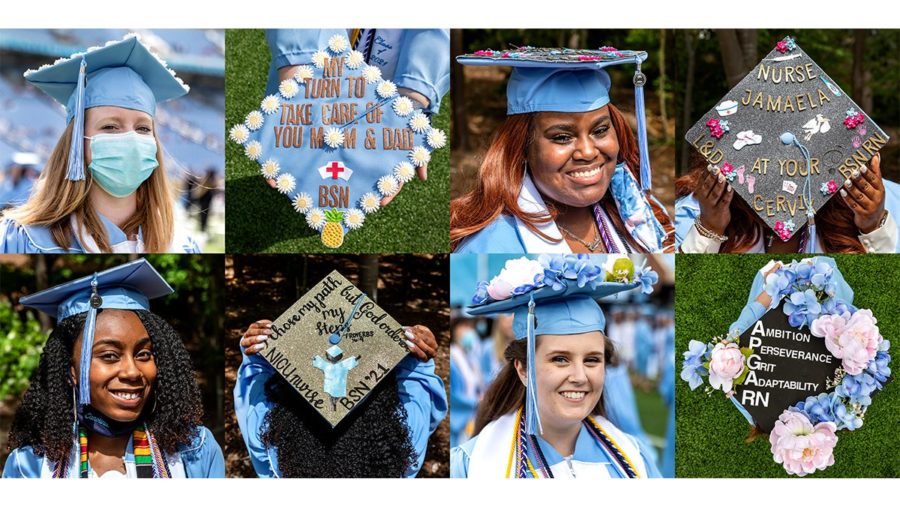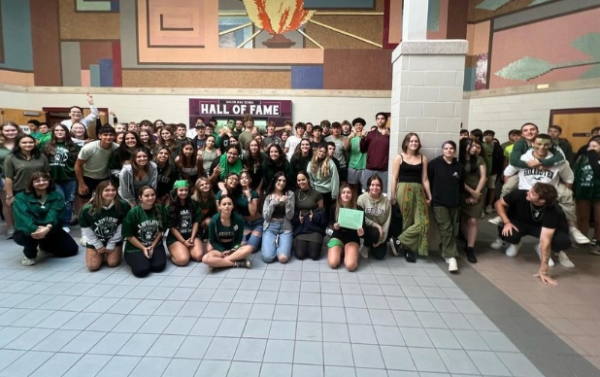LHS prohibits decorating grad caps
This policy violates the students’ freedom of expression and makes no sense.
June 7, 2022
Graduation caps signify one of the most important days in a student’s career. When one walks up onto a stage to finally receive that hard-earned, sought-after diploma, the small square upon which sits above their head tells a story. The hundreds of peers, former teachers, and family members all witnessing you do the same action as everyone else needs to have some form of individuality. The cap can be an extension of a student themselves, as a small part of what identifies them as something other than just “another student graduating.”
Sure, everyone gets to wear one, but decorating it and assigning it individuality makes graduation day just that much more personal than the receiving of a diploma. For decades in this nation, American students have been allowed to put whatever they wanted on their caps, mementos, photographs, sports memorabilia, or really anything that holds significant value to their student career.
Imagine being valedictorian or an all varsity athlete and not being allowed to put a soccer ball or A+ symbol on your cap.
Likewise, why isn’t Ludlow allowing our graduating seniors to do the same thing? Personally, I was shocked to find out from many of my friends that they weren’t going to be able to do this thing that personally I had been looking forward to. I had great plans for how my grad cap would look, so I decided to ask around to figure out what was going on and in turn try and persuade whatever officiating is causing it.
First, I asked Mr. Mitchell why the rule was in place. He said he didn’t know when or why it started, just that “it was a School Committee policy.”
“I wish I could decorate my cap because after working towards graduation for 12 years,
I feel like you should be able to show the individualism and personality that you develop over the years,” said Senior Wriley Scott. “If I could decorate my cap I would probably cut out pictures of me and my friends over the years and make it colorful to appreciate times during school.”

This is also something I feel like many students would do, considering the importance friends and peers had on our school lives. Self-expression is important and high school students should especially have this right.
“I do believe it’s important for students to express these things because school is such a big chapter of your life and graduation is the last day of that chapter, and you should be able to express yourself one last time before starting a new chapter of your life.”
Now it’s not just Wriley and I who have this sentiment, it’s the majority of seniors and juniors as well. The upcoming graduates also have formed opinions on the importance of this topic and have been willing to express their passion for me. One of those juniors is Riley Londraville, another friend of mine who plays a major role in all school events. Despite being the Junior class president, she’s instrumental in making many changes throughout LPS so having her opinion on the matter might sway the masses who oppose it.
“As class president, it’s my job to hear all of your ideas and desires. Especially going into senior year I want everyone to feel heard and this has been a common question.” She responded in a genuine way, typical of someone who represents their class.
Londraville plans to address this issue with the administration next year. “In the past this has been against the rules, although I think it’s important and a great way to show our individuality and creativity so I’ll make this a point to bring this up to student council administration”.
I then strayed a little from the ‘political’ aspect of being allowed to wear caps and asked a recreational question. I said to Riley, “how would you decorate your cap if you were able to”?
Riley’s response bore great similarities to Wriley’s, saying “If I could decorate my cap I would probably make a photo collage with the people that mean the most to me as a way to honor their support throughout my high school experience.”
This is interesting to me because they both established a theme of wanting to show support for not just their own achievements, but to show love and kindness to those who helped get them into their graduate position.
As a student, my beliefs align very closely with that of Riley and Wrileys. Perhaps those who are making the rules don’t have the same mentality we possess. As girls growing up in an age where we have thousands of memories at our fingertips, perhaps we feel more inclined to represent those on one of the biggest days of our lives. Maybe it’s that those who graduated before the advent of easy and quick-to-produce media lack the vision to see why decorating grad caps are important.
For this reason, I decided to interview someone older as my next individual to see maybe why the older generation holds different views than us younger kids. My goal was to get some hopeful words about the status of grad caps going into the future. The man I interviewed was everyone’s favorite interim principal, Mr. Mitchell.
I got right to the point saying “When and why did the ban against decorating caps begin”?
His answer: “Students have not been allowed to decorate the tops of their caps since I began working here at LHS 9 years ago. I am unsure how long it has been in place.” This shocked me partially because I took that as an indication it hasn’t been discussed much.
Regardless, since I was speaking to my principal, I still felt and saw the opportunity to persuade him into the ideal I cared for, I said: “Would you be willing to undo this with restrictions”?
Much to my demise, he responded “ This policy is out of my control. This is a School Committee policy, so any suggested changes would have to go in front of them for approval. Personally, I like the caps not decorated. I think it keeps everything uniform and very formal, which is the way we try to keep our graduation ceremonies.”
Even though this was a total punch in the gut and not what I wanted to hear, it answered my earlier hypothetical question about the older generation having different views perfectly. Indeed, those who are not from an age where we shove media into our faces would also not want to shove it onto grad caps.
Logically, I only had one last question to ask then, “If we can only make change through the school board, how could I or we as a student body go about contacting them”?
Mr. Mitchell chuckled and said “It’s easy, all you have to do is look up your school reps. I’m sure you’ve heard of names like Chip Harrington. Those are the ones you have to speak with. Attend a school board meeting with your classmates and speak up, make your presence and ideas heard.”
Maybe the Class of 2023 can come together and make a formal request.
It’s true, we can’t just plead with teachers and principals who have little control over the issue, we have to legitimately represent ourselves in a committee to show how much we really care. This is why I urge you, reader, to get out there to the next school meeting/committee and voice your opinion! We need to allow students to represent themselves as individuals and unique beings, especially on such a grandiose day of their lives. It’s almost like every student works their entire career just to end up like everyone else, a maroon outfit and square hat, how fun. I encourage and implore you to attend our next school meeting and bring your best ideas forth!











Vitto Pacheco • Jun 9, 2022 at 11:56 am
The gown, formal layout, orgization of said graduation, distinguished academia personnel, friends and family, and award ceremony come together to make the event professional. Allowing students to repectfully personalize their caps doesn’t take away from the purpose of the graduation and its ceremony. If anything it allows it to be more special and memorable for the graduating class, as it should. The graduation isn’t for the school staff or even the family of the students, its for the graduating class. Its to acknowledge their hard work and celebrate their accomplishments. I fully support the personalization of the caps and believe that the current policy should be changed.
shelbey auclair • Jun 9, 2022 at 12:19 pm
thanks v I love you
Mrs Nemeth • Jun 8, 2022 at 8:33 pm
Interesting and well written article! Mrs. Nemeth already has a few surprises in store for the Class of 2023! Stay tuned!!